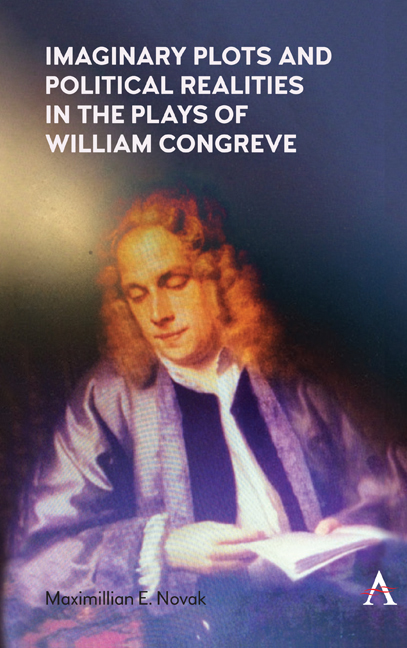Book contents
- Frontmatter
- Contents
- List of Illustrations
- Acknowledgments
- Preface
- 1 The Politics of Love, Marriage, and Scandal in Congreve's World
- 2 Incognita and Some Problems in Morality and Epistemology
- 3 The “Fashionable Cutt of the Town” and William Congreve's The Old Batchelor
- 4 Political and Moral Double Dealing in Congreve's The Double Dealer
- 5 Foresight in the Stars and Scandal in London: Reading the Hieroglyphics in Congreve's Love for Love
- 6 The Failure of Perception and Politics in Congreve's The Mourning Bride
- 7 Politics and Congreve's The Way of the World
- Afterword
- Works Cited
- Index
1 - The Politics of Love, Marriage, and Scandal in Congreve's World
Published online by Cambridge University Press: 21 July 2020
- Frontmatter
- Contents
- List of Illustrations
- Acknowledgments
- Preface
- 1 The Politics of Love, Marriage, and Scandal in Congreve's World
- 2 Incognita and Some Problems in Morality and Epistemology
- 3 The “Fashionable Cutt of the Town” and William Congreve's The Old Batchelor
- 4 Political and Moral Double Dealing in Congreve's The Double Dealer
- 5 Foresight in the Stars and Scandal in London: Reading the Hieroglyphics in Congreve's Love for Love
- 6 The Failure of Perception and Politics in Congreve's The Mourning Bride
- 7 Politics and Congreve's The Way of the World
- Afterword
- Works Cited
- Index
Summary
John Dryden, who specialized in poetry involving elaborate and occasionally exaggerated encomiums, praised William Congreve as a playwright who might equal Shakespeare. Commenting upon Congreve's second play, The Double Dealer, Dryden argued that Congreve's writings appeared to have the “strength” of the great Elizabethan and Jacobean playwrights combined with the “skill” of the writers of the Restoration.
Thy first attempt an early promise made;
That early promise this had more than paid.
So bold, yet so judiciously you dare,
That your least praise is to be regular.
Time, place, and action may with pains be wrought,
But genius must be born, and never can be taught.
This is your portion, this your native store;
Heav’n, that but once was prodigal before,
To Shakespeare gave as much; she could not give him more.
Congreve certainly had a major reputation during his lifetime. But no modern literary historian has suggested naming any part of the period in which he lived “the Age of Congreve,” in the way such a designation has frequently been assigned to his contemporaries: Jonathan Swift, Daniel Defoe, Alexander Pope, or even Joseph Addison. Yet his contribution of four excellent comedies and a tragedy to the literature of the English Stage was far from insignificant. Three of his plays have been revived in productions of the National Theatre and, of course, university classes in the history of the English drama are almost certain to contain one of his comedies. If he never achieved the heights of greatness imagined by Dryden, he is still to be regarded as a major British playwright.
His importance has frequently been ascribed to his witty dialogue and the charming nature of his lovers— especially Angelica and Valentine in Love for Love and Millamant and Mirabell in The Way of the World. But much of such admiration has its origin in Charles Lamb's vision of Restoration comedy as depicting an artificial milieu having little connection with a real world of sexual desire and betrayal. Whereas Lamb viewed the stage of his own time as being deeply involved in questions of morality, he argued that Congreve’s plays revealed a “privation of moral light.” Lamb's criticism was constructed to protect Restoration comedy from a century of attacks depicting it as entirely immoral.
- Type
- Chapter
- Information
- Publisher: Anthem PressPrint publication year: 2020



